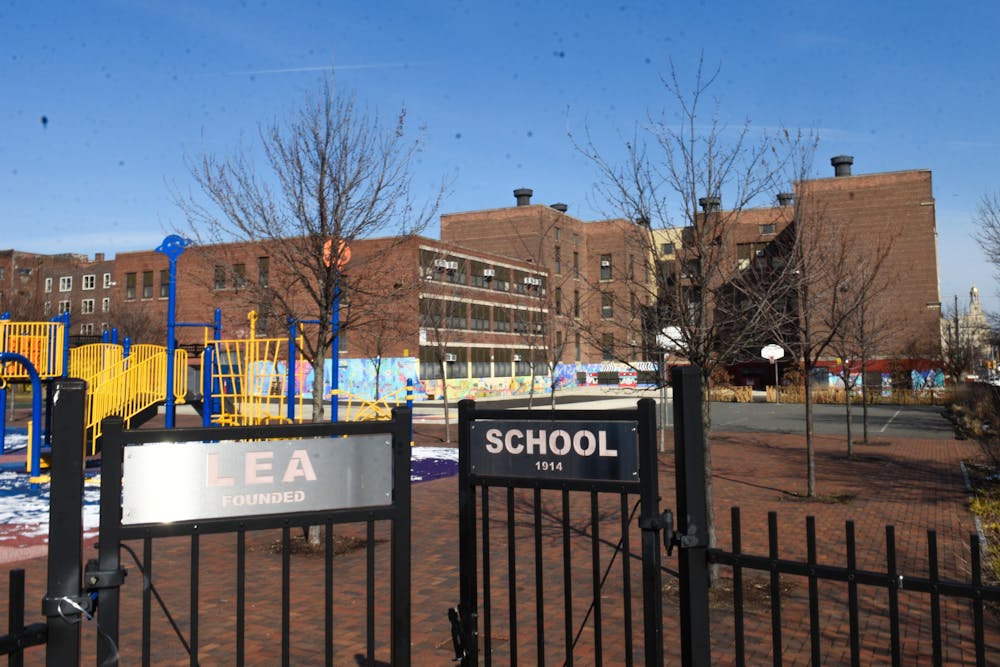
Penn invested $4.1 million into Henry C. Lea Elementary School in January of 2022.
Credit: Derek WongAcross 217 public schools and 124,111 students, there are only four certified school librarians in the entire city of Philadelphia. While that may not come as a surprise given how underfunded the Philadelphia School District is, it should come as a concern.
School librarians have been proven time and time again to make a positive difference in students’ academic achievement. Within the state, almost 8% more students received a score of Advanced on the Pennsylvania System of School Assessment in reading when they attended schools with fulltime librarians, in comparison to those without. For vulnerable learners, such as students of color and low-income students, good school librarians boost academic achievement by an even larger margin. That’s an important distinction, given that 85.5% of students attending Philadelphia public schools are nonwhite and 70.5% of students qualify for free or reduced lunch.
It’s jarring to think about Philadelphia's poverty in juxtaposition to Penn’s wealth. Out of the ten largest cities in the United States, Philadelphia is the poorest with a poverty rate of 21.7%. Alternatively, Penn is the sixth wealthiest private university in the country. The Philadelphia School District predicts a $46 million deficit by fiscal year 2026 and a $485 million deficit by fiscal year 2027. Penn, on the other hand, has a $4.4 billion operating budget.
This borderline dystopian contrast between Penn and Philadelphia is exacerbated by Penn’s miserliness. Penn refuses to pay PILOTs, or Payments in Lieu of Taxes to Philadelphia, a controversial and often-debated topic on campus. PILOTs is a payment made by tax-exempt organizations to the local government, as a means to compensate for a portion of the property tax revenue that is lost.
In 2020, Penn committed $10 million per year to the Philadelphia School District over the following 10 years — money that was intended to remediate asbestos, lead, and other environmental hazards. While this funding has helped to gradually improve substandard physical conditions, it did little to improve substandard academic resources, such as underfunded libraries. Furthermore, this donation is a mere fraction of how much Penn would owe in property taxes and PILOTs, if they chose to pay either. Penn’s property taxes amount to $91 million per year and its PILOTs amount to about $40 million per year.
In response to these criticisms, Penn has stated that it gives back to the Philadelphia School District in other ways: their partnerships with the Penn Alexander School and Lea Elementary School, for example. Because of Penn’s assistance, students at Penn Alexander School perform well above the state average, and Lea’s libraries are highly supported and staffed.
Yet, this selective funding of Philadelphia’s public schools is inadequate. Simply put, the strong performance of two schools does not negate the weak performance of the other 215. Penn’s philanthropy does little to attack the root of the problem, chronic underfunding of the Philadelphia School District, and instead chooses generosity only at Penn's will.
Instead, the money that Penn gives to public schools should be governed by democratic procedures, as are all taxes paid by the city’s residents. It should be at the discretion of the Philadelphia government to distribute these funds as they see fit, rather than have Penn directly invest in select schools and students. That’s not to say that Penn should refrain from philanthropy aimed at Philadelphia public schools entirely; it is possible to do both, as other institutions frequently have.
If not out of moral obligation, Penn should support Philadelphia schools for its own sake. The University relies on the city in a multitude of ways — from marketing its dynamism to prospective students to hiring faculty and staff from every neighborhood. The trickle-down effect of a strong education means better opportunities and outcomes for Philadelphia residents who come out of the public school system, thereby bolstering the city that Penn depends so much on.
While we wait for the day that Penn finally decides to pay PILOTs, Penn students can and should take action on their own. House Bill 1168, “One Certified Librarian per Public School,” is intended to mediate the lack of public school librarians in Pennsylvania. I urge you to contact your state representative and ask them to sign the co-sponsorship memorandum. If you are living on or near Penn’s campus, reach out to state Rep. Rick Krajewski; otherwise, you can find your state representative here.
Penn understands the importance of school librarians. It has said so itself: “It’s a lot harder for kids to be successful in an environment where they don’t have access to resources.” The students of Philadelphia deserve better. They deserve the power that comes with well-funded libraries — access to information and knowledge at just the flip of a page.

SANGITHA AIYER is a College sophomore from Singapore. Her email is saiyer@sas.upenn.edu.
The Daily Pennsylvanian is an independent, student-run newspaper. Please consider making a donation to support the coverage that shapes the University. Your generosity ensures a future of strong journalism at Penn.
Donate



